Overview
This article is dedicated to helping veterans secure a favorable VA rating for Chronic Fatigue Syndrome (CFS). We understand that navigating this process can be overwhelming, and we want to provide you with actionable steps to make it easier.
First and foremost, comprehensive medical documentation is crucial. Keeping thorough records of your symptoms can significantly impact your application. Have you considered tracking your daily experiences? This can help paint a clearer picture of your condition.
Additionally, seeking assistance from advocacy organizations can enhance your chances of success. Many veterans have found that these groups provide invaluable support and guidance. Remember, you are not alone in this journey; there are resources available to help you.
Data shows that utilizing these strategies can lead to higher success rates. By taking these steps, you can feel more confident in your application process. We are here to help you every step of the way, ensuring that your voice is heard and your needs are met.
Introduction
Navigating the complexities of securing a Chronic Fatigue Syndrome (CFS) VA rating can feel overwhelming for many veterans. We understand that the potential for significant benefits and support is crucial, and grasping the intricacies of the application process is essential. This article outlines key steps and strategies designed to empower former service members, enhancing their chances of obtaining a favorable rating.
What challenges might you face on this journey, and how can you effectively overcome them to ensure you receive the support you truly deserve?
Turnout: Streamlining Chronic Fatigue Syndrome VA Rating Applications
Turnout is transforming the application process for individuals seeking chronic fatigue syndrome VA ratings by integrating advanced AI technology. This innovative platform streamlines the application process, making it more accessible and less intimidating for former service members. We understand that navigating these systems can be overwhelming, and that's why Turnout is here to help.
Significantly, Turnout is not a legal practice and does not offer legal representation; rather, it employs trained non-professional advocates to assist with SSD requests. Key features, such as automated document management and proactive follow-ups, ensure that service members remain informed and supported throughout their pursuit of benefits. It's common to feel lost in the process, but with Turnout, you are not alone.
This streamlined method not only decreases processing durations but also greatly improves the likelihood of successful requests, effectively tackling the typical frustrations individuals face with conventional systems, much like the chronic fatigue syndrome VA rating aims to address the challenges faced by patients. With the Board of Veterans Appeals recently exceeding 92,000 dispatched disability appeals, the efficiency of AI in claims processing is becoming increasingly clear. This highlights a promising transition towards quicker and more dependable results for service members, giving you hope for a smoother journey ahead.
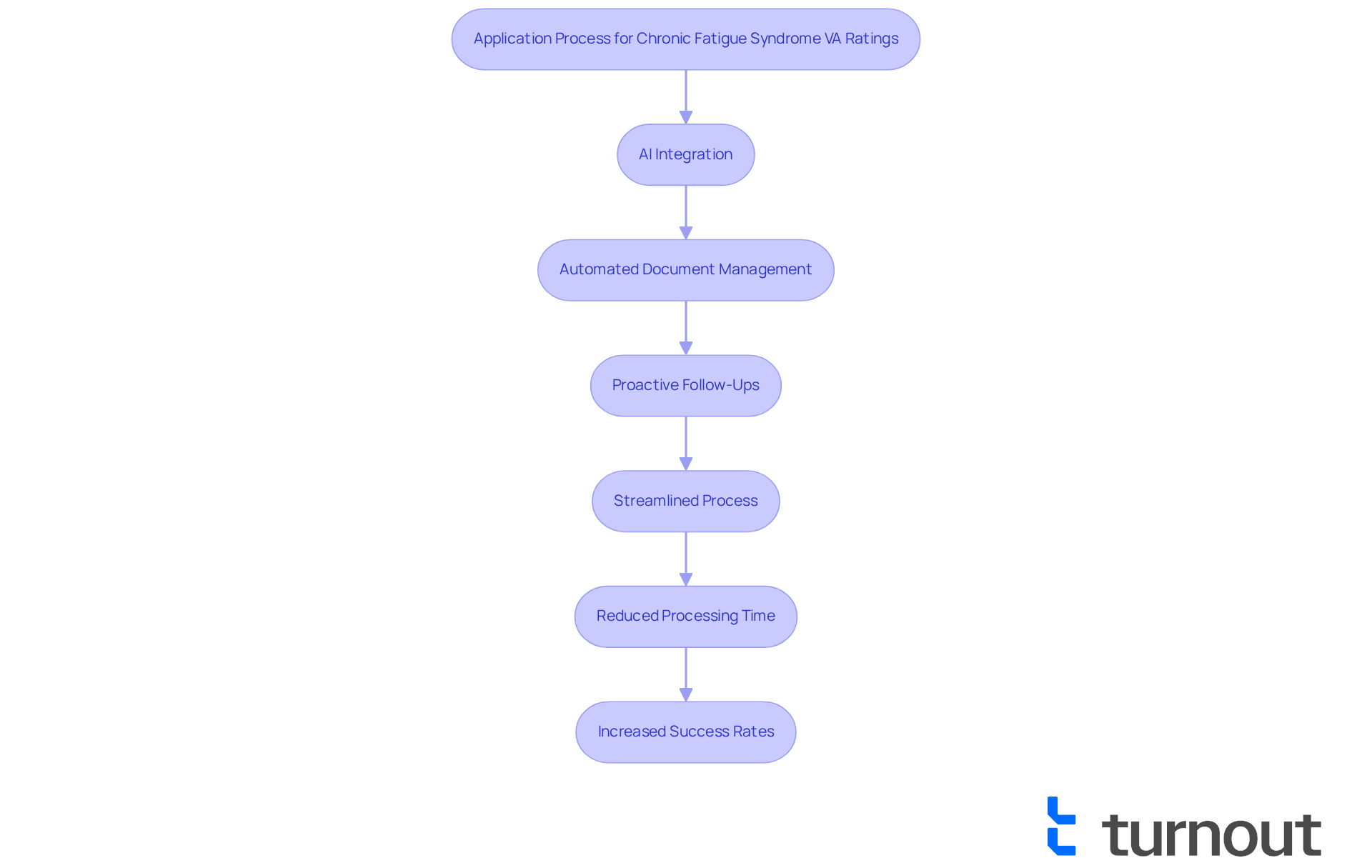
VA Evaluation Criteria for Chronic Fatigue Syndrome Ratings
We understand that navigating the complexities of Chronic Fatigue Syndrome can be challenging. The VA evaluates chronic fatigue syndrome VA rating under diagnostic code 6354, taking into account the severity and frequency of symptoms. The chronic fatigue syndrome VA rating can vary from 10% to 100%, depending on how much the condition affects your daily life. It's crucial to recognize the key evaluation criteria for chronic fatigue syndrome VA rating, which encompass:
- Debilitating fatigue
- Cognitive impairments
- The impact of these symptoms on your ability to work and engage in daily activities
You are not alone in this journey. Grasping these standards is essential for former service members like you to effectively present your case and secure the chronic fatigue syndrome VA rating that you deserve. Remember, we're here to help you every step of the way.
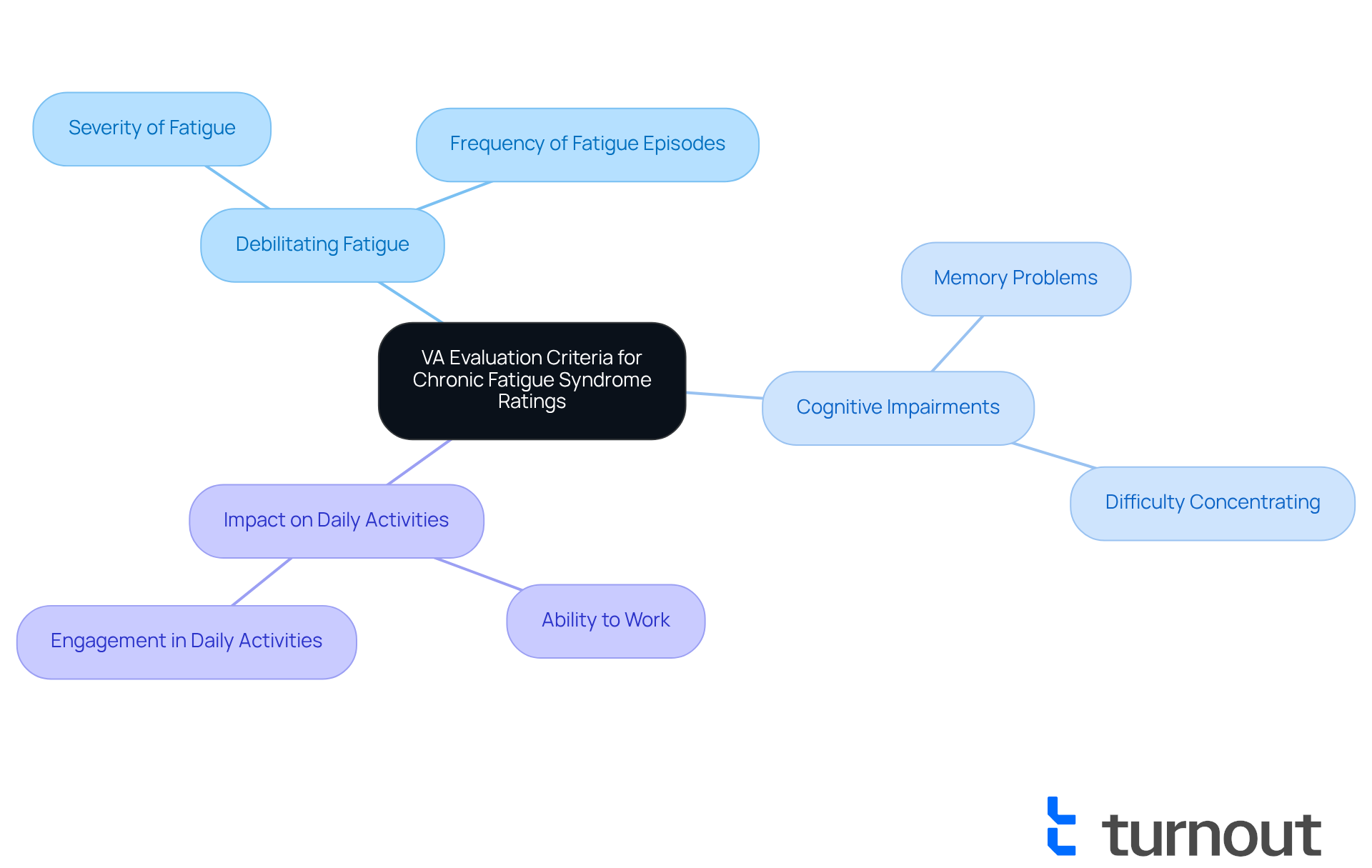
Key Symptoms of Chronic Fatigue Syndrome Affecting VA Ratings
If you are a veteran seeking a chronic fatigue syndrome VA rating, it's important to recognize the key symptoms that can significantly impact your evaluation.
- Persistent fatigue that doesn't improve with rest
- Cognitive difficulties like memory loss and concentration issues
- Sleep disturbances
- Physical symptoms such as muscle pain and joint discomfort
We understand that recording these symptoms precisely and regularly can feel overwhelming, but it's crucial for illustrating the seriousness of your condition and its impact on your everyday life. Remember, you are not alone in this journey, and we’re here to help you navigate it.
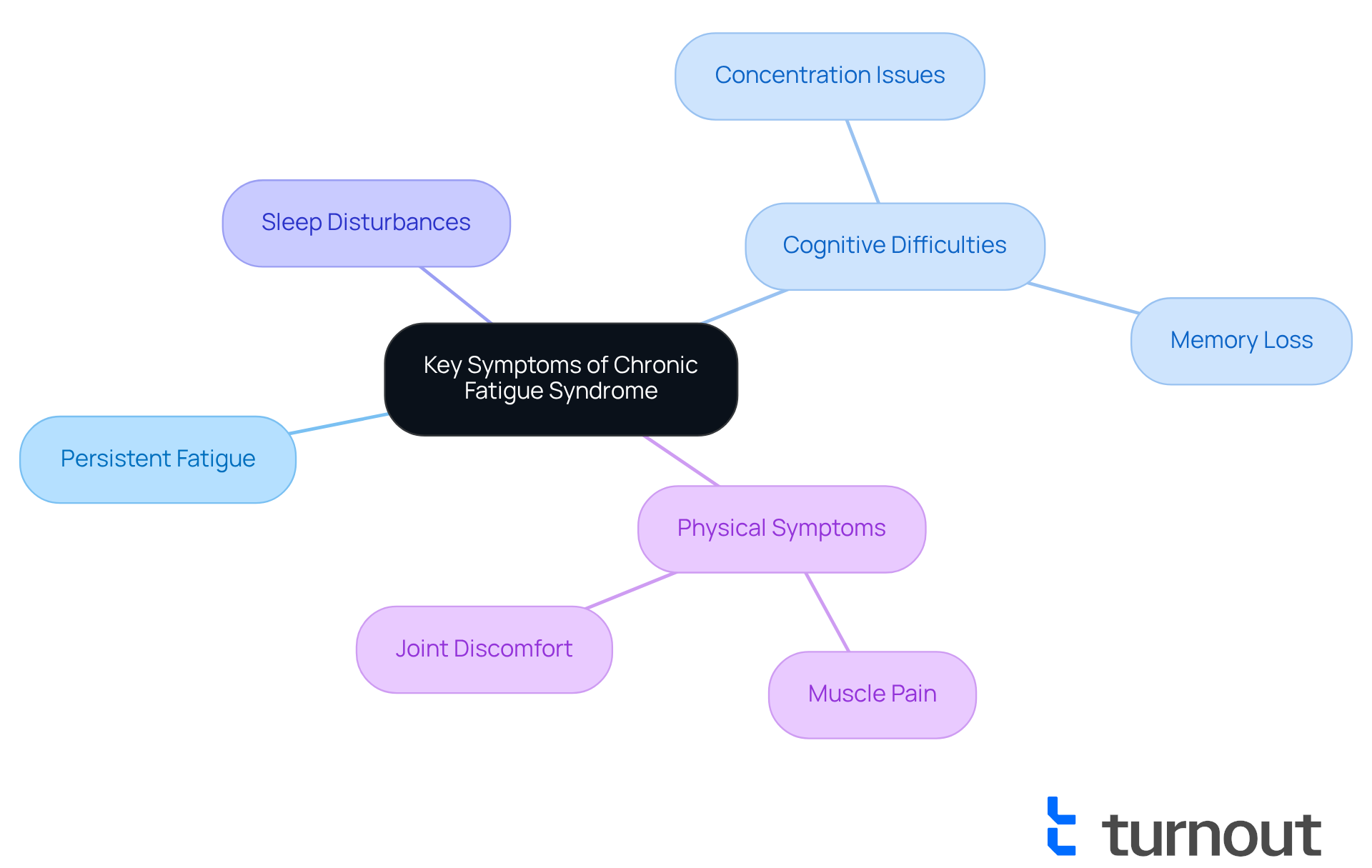
Importance of Medical Documentation for VA Ratings
Medical documentation is the cornerstone of a successful VA request for a chronic fatigue syndrome VA rating. We understand that navigating this process can be overwhelming. Veterans must provide comprehensive medical records that detail their diagnosis, treatment history, and the impact of their chronic fatigue syndrome VA rating on their daily lives. This includes records from healthcare providers, results from diagnostic tests, and any prescribed treatments.
Moreover, personal statements from relatives or caregivers can further support the assertion by demonstrating how the condition impacts the veteran's daily functioning. It's common to feel uncertain about what to include. Veterans who have carefully recorded their experiences have reported significantly higher approval rates for their requests. In fact, the Veterans Benefits Administration processed over 2.5 million disability compensation applications in 2024, reflecting a commitment to enhancing the application process.
Making sure that all documentation is comprehensive and systematically arranged can greatly improve the likelihood of a positive assessment for the chronic fatigue syndrome VA rating. At least one kind of document is necessary to substantiate requests for increased compensation. Additionally, a robust medical nexus letter is crucial. The lack of a persuasive nexus letter is a frequent cause for denial of requests.
Quotes from veterans about their documentation experiences provide valuable insights into the importance of thoroughness in the claims process. Remember, you are not alone in this journey; we’re here to help you every step of the way.
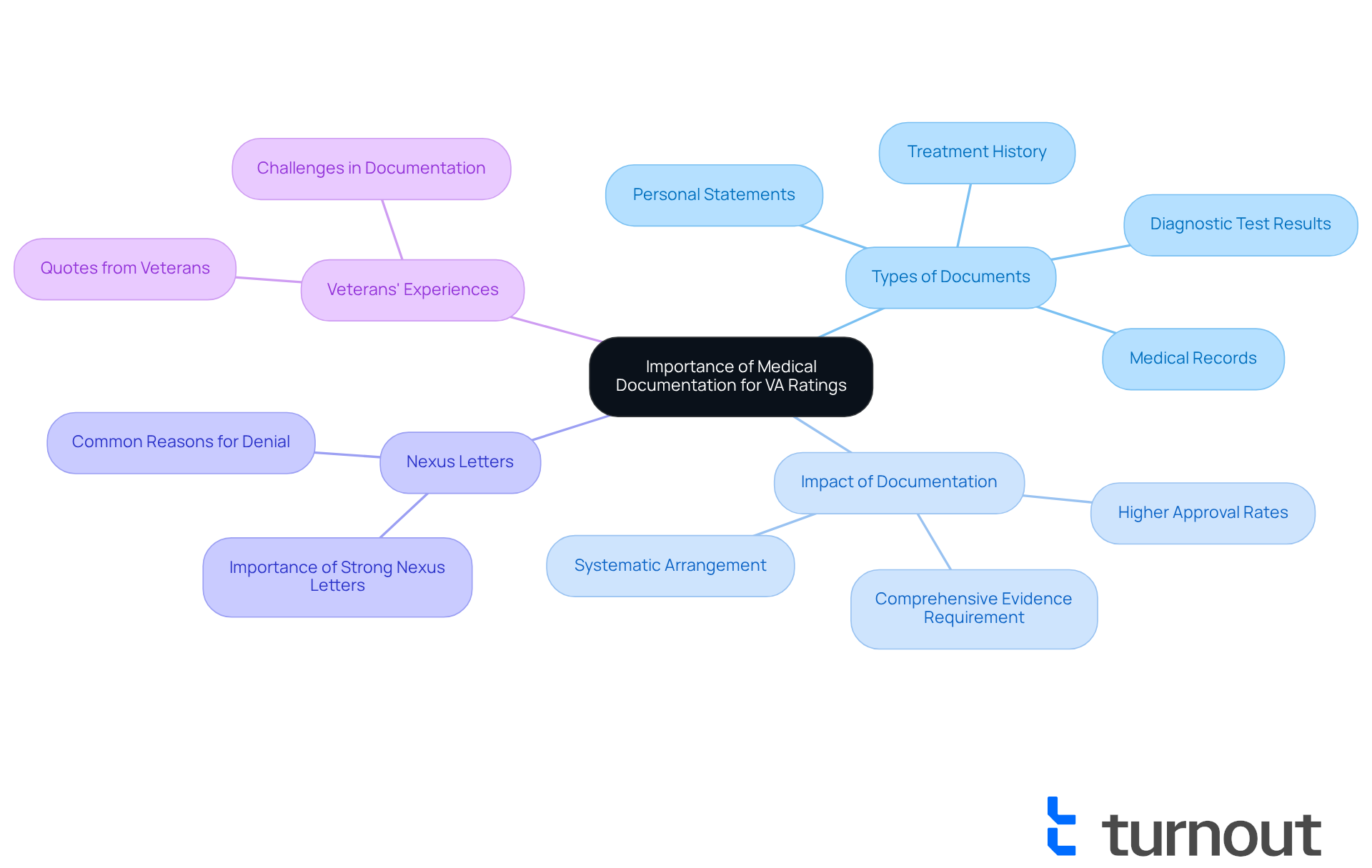
Benefits and Compensation for Veterans with Chronic Fatigue Syndrome
Veterans diagnosed with Chronic Fatigue Syndrome (CFS) often face significant challenges related to their chronic fatigue syndrome VA rating. However, there are various benefits and compensation options available through their VA assessments, particularly concerning chronic fatigue syndrome VA rating, designed to support their unique needs. These benefits include monthly disability payments, healthcare services, and vocational rehabilitation programs.
The compensation amount can vary greatly, particularly in relation to the chronic fatigue syndrome VA rating and the severity of the condition. Higher disability ratings, including the chronic fatigue syndrome VA rating, correspond to increased financial assistance. For example, a veteran with a 70% disability rating can receive a monthly payment of $2,018.19, while those rated at 100% may receive up to $3,600.00, depending on their family situation.
We understand that individuals with CFS who find it difficult to work may be eligible for Total Disability Individual Unemployability (TDIU). This program allows them to receive benefits at the 100% rate, regardless of their assigned disability percentage, ensuring they have the financial resources necessary to manage their condition.
It's common to feel overwhelmed when navigating the benefits system. Statistics show that many veterans with CFS struggle to secure these benefits. Currently, the average time to finalize VA disability-related applications is 136 days. Moreover, applications based solely on CFS often require persuasive medical evidence to succeed. Veterans have shared their experiences, emphasizing the importance of thorough documentation and support from healthcare providers in this process. One veteran shared, 'With the right support and evidence, I was able to secure the benefits I needed to manage my condition effectively.'
Understanding the nuances of the chronic fatigue syndrome VA rating and related compensation can empower service members to advocate for themselves. Remember, you are not alone in this journey, and we’re here to help you access the resources you deserve.
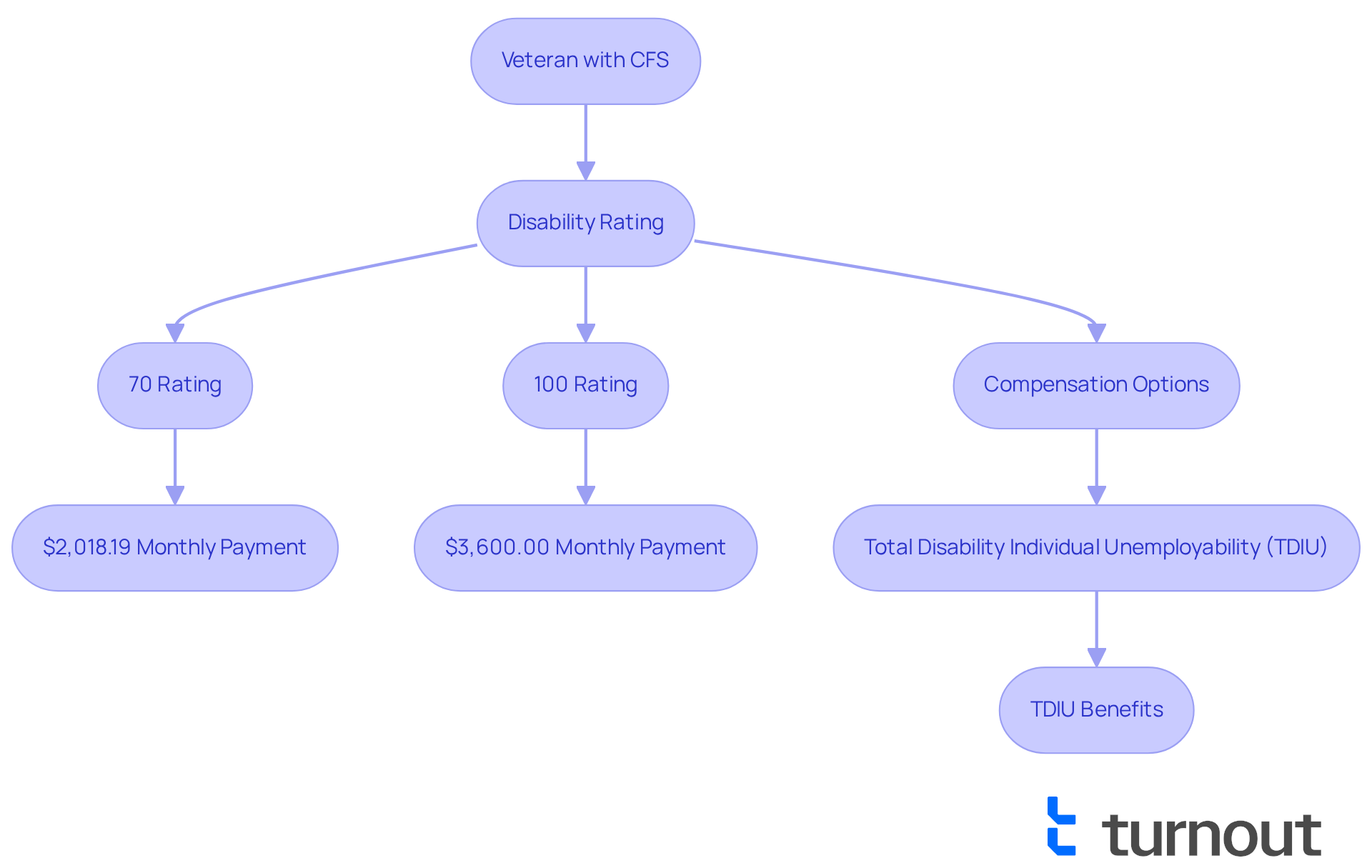
Navigating the Appeals Process for VA Rating Denials
When a service member's request for Chronic Fatigue Syndrome VA rating is rejected, understanding the appeals procedure becomes crucial. We recognize that this can be a challenging experience. Veterans have the right to appeal the decision on their chronic fatigue syndrome VA rating by submitting a Notice of Disagreement (NOD) within one year of the denial. The appeals process typically involves several key steps:
- Gathering New Evidence: Collect updated medical evaluations and specialist reports that reflect the current severity of the condition. This evidence is vital for strengthening your appeal for the chronic fatigue syndrome VA rating.
- Requesting a Higher-Level Review: If the initial decision seems unfair, you can pursue a higher-level review. Here, a senior claims adjudicator reevaluates the case without new evidence.
- Appealing to the Board of Veterans' Appeals: If the result remains unfavorable, military service members can escalate their case to the Board of Veterans' Appeals. Meticulous documentation and preparation can enhance your chances of success.
Staying organized and proactive throughout this process is essential. Timely and well-documented appeals significantly improve the likelihood of a favorable outcome regarding chronic fatigue syndrome VA rating. For instance, almost 40% of cases reviewed by the Board lead to a positive outcome for the service member. This statistic emphasizes the importance of comprehensive preparation. Furthermore, the general success rate for VA disability appeals in 2022 was 38.9%, providing context for your likelihood of success with a chronic fatigue syndrome VA rating.
We encourage veterans to maintain detailed records of all interactions with the VA and to respond promptly to any requests for additional information. It may also be beneficial to consider obtaining independent medical evaluations to strengthen your appeal. By following these steps, you can navigate the complexities of the VA appeals process more effectively and increase your chances of securing the benefits you deserve. Remember, you are not alone in this journey; we're here to help.
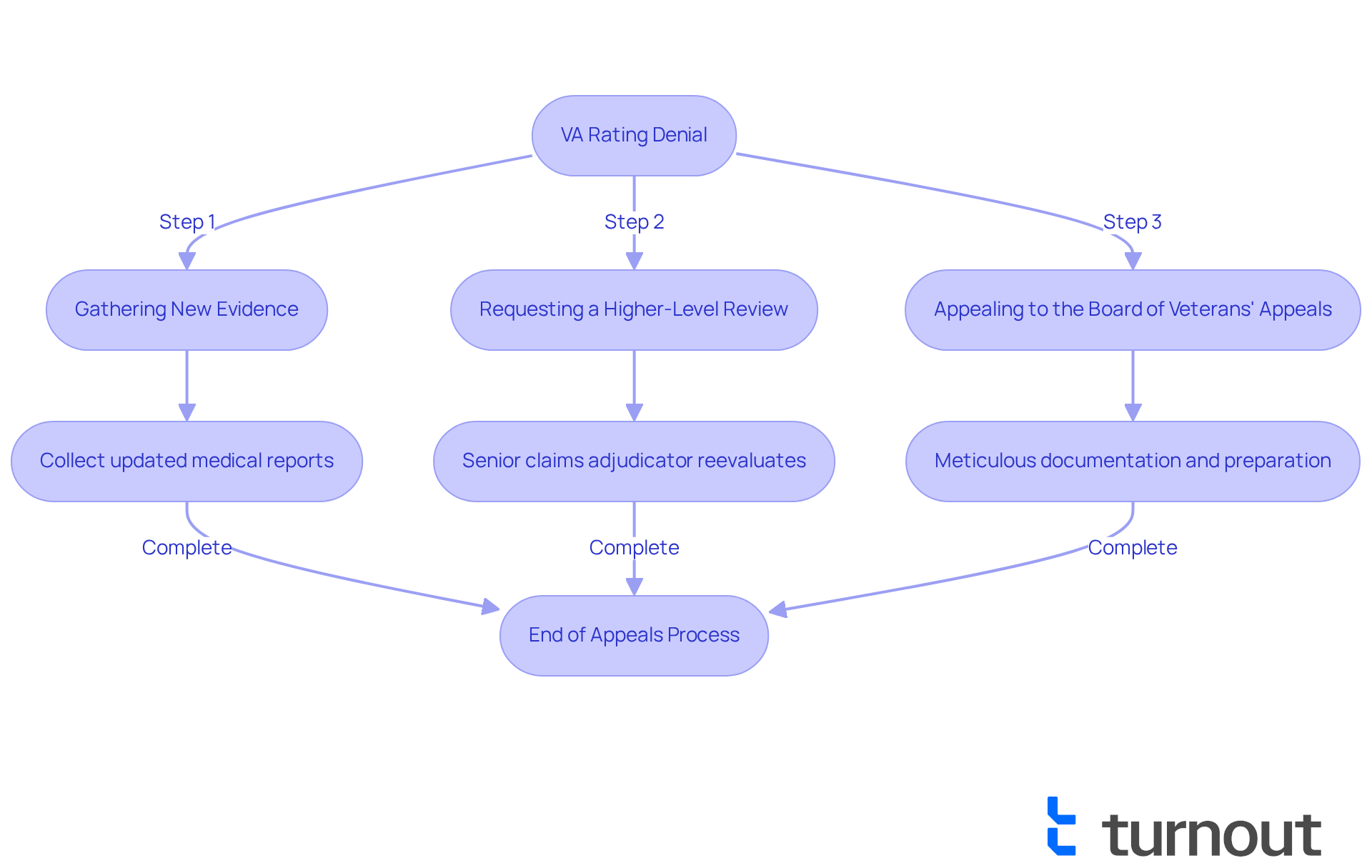
Support Groups and Resources for Veterans with Chronic Fatigue Syndrome
For veterans grappling with Chronic Fatigue Syndrome VA rating, engaging with support groups and accessing tailored resources can be a lifeline. These groups create a safe space where former service members can share their experiences, coping strategies, and emotional support. Organizations like the Wounded Warrior Project and various local service groups often host support meetings and workshops designed to foster connection and resilience.
We understand that finding community is crucial. Online forums and social media groups serve as vital platforms, linking former service members with peers who truly grasp their challenges. This sense of community is essential for enhancing mental health and overall well-being, as it encourages sharing and learning from one another's journeys.
Additionally, consider the 'Wellness Guide for Service Members,' which has been downloaded over 3,500 times. This guide offers valuable resources tailored to the unique needs of former military personnel. Given that 14% of former service members are diagnosed with depression, the importance of community support in addressing these mental health challenges cannot be overstated. Remember, you are not alone in this journey; we’re here to help.
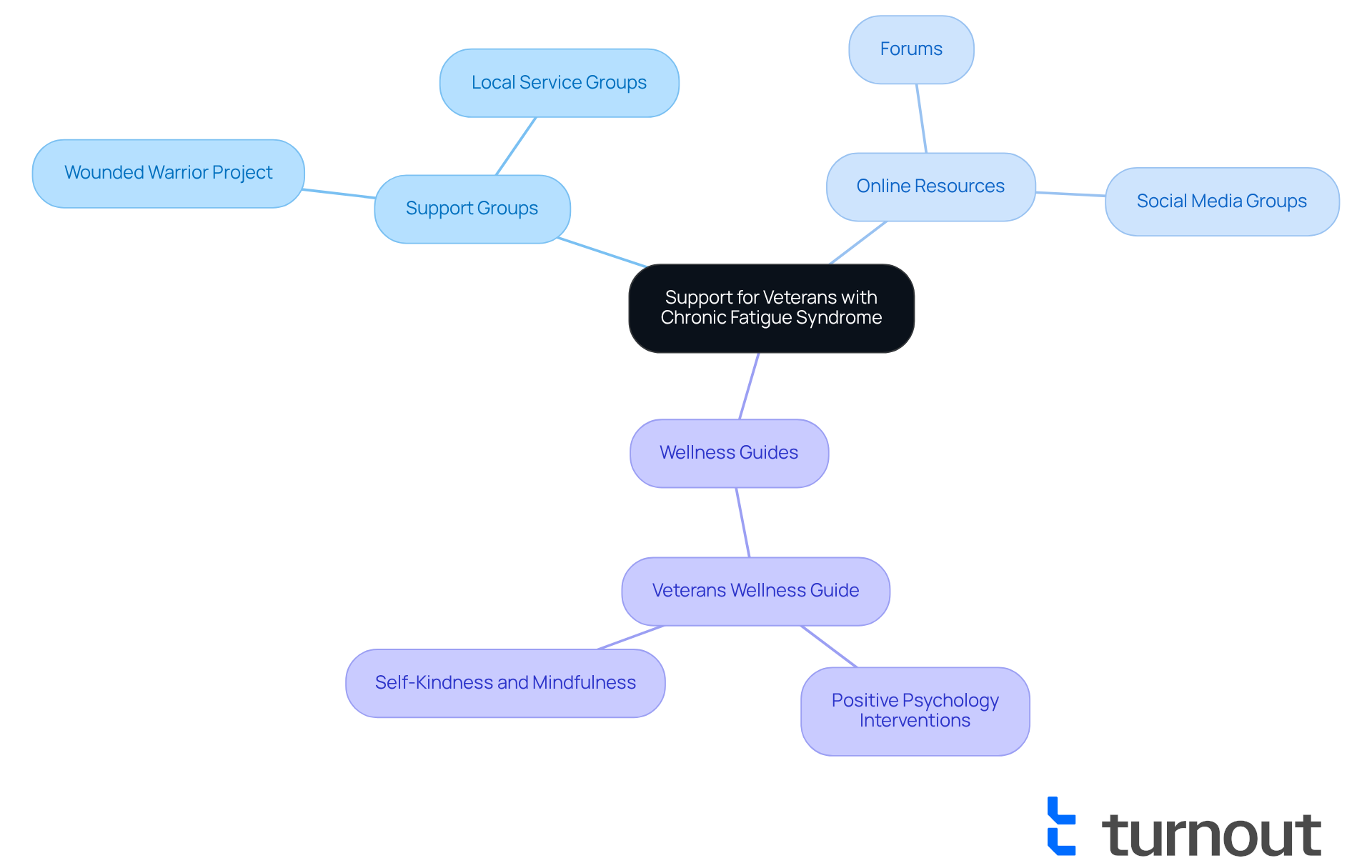
Impact of Chronic Fatigue Syndrome on Daily Life and Work
Chronic Fatigue Syndrome VA rating can profoundly impact a service member's daily life and work capabilities. We understand that symptoms like extreme fatigue, cognitive dysfunction, and physical pain can make routine tasks challenging and hinder employment and social engagement. Many former service members find themselves needing to adjust their work schedules or even leave their jobs completely due to the debilitating nature of this condition.
Understanding these effects is crucial for former service members as they navigate the chronic fatigue syndrome VA rating application journey. This understanding enables them to present a persuasive case for the assistance they require. It’s common to feel overwhelmed, but remember, there are resources available to support you.
One such resource is Turnout, which offers services to help navigate government-related processes like Social Security Disability (SSD) claims. Turnout employs trained nonlegal advocates who assist service members in understanding their options and simplifying their applications for benefits. This support ensures you receive the financial assistance you deserve without the added stress of professional representation.
You are not alone in this journey. We’re here to help you find the assistance you need to improve your quality of life.
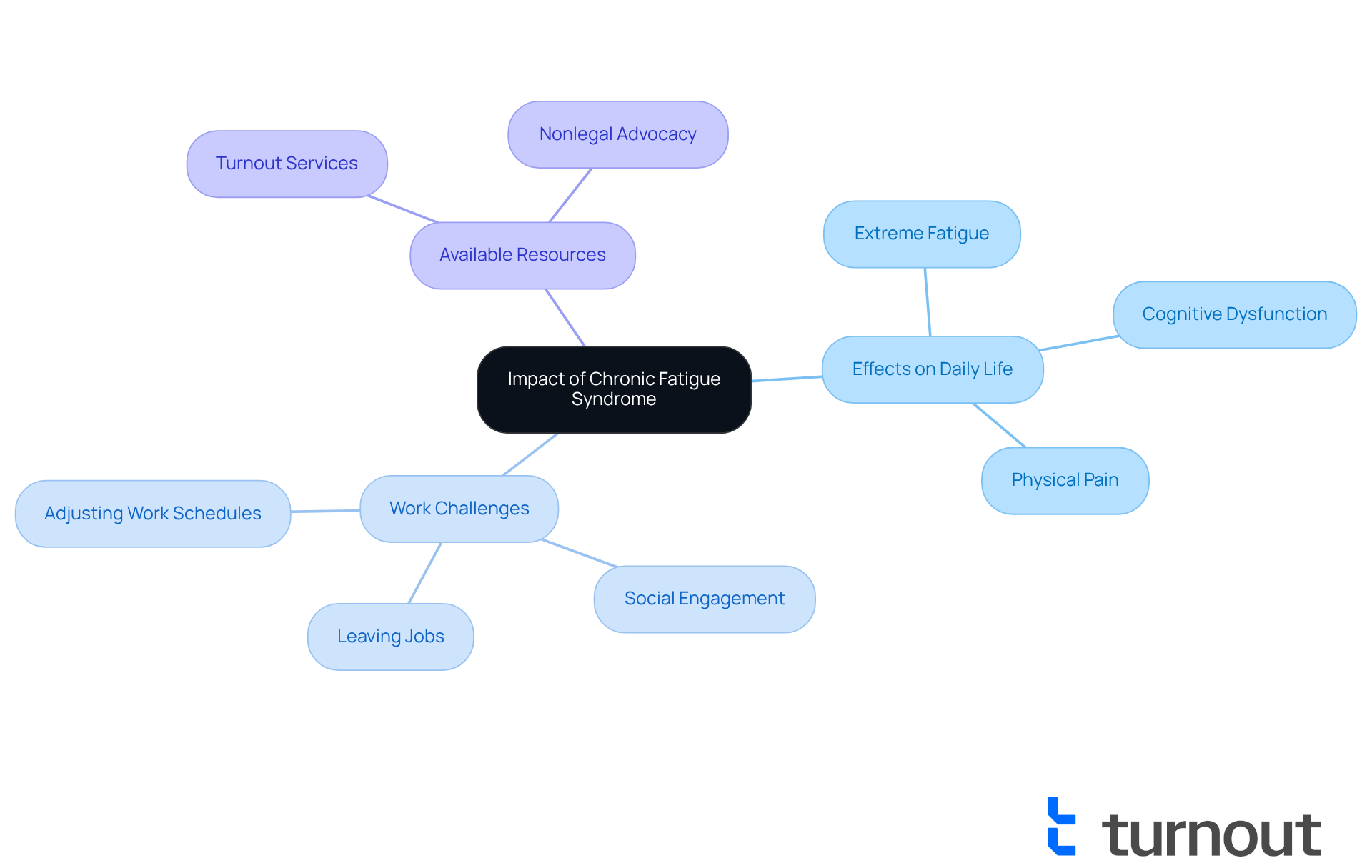
Understanding the VA Rating Schedule for Chronic Fatigue Syndrome
Understanding the chronic fatigue syndrome VA rating evaluation schedule can feel overwhelming. This schedule is designed to measure the severity of your condition based on specific criteria outlined in diagnostic code 6354. Ratings are assigned in increments of 10%, ranging from 0% to 100%. These ratings reflect the frequency and severity of your symptoms. For instance, a 10% score may indicate mild symptoms that occasionally disrupt your daily activities. In contrast, a 100% score signifies severe symptoms that greatly restrict your ability to operate.
We understand that navigating this process is crucial for former service members like you. Comprehending this schedule is essential to assess your eligibility for the chronic fatigue syndrome VA rating and organize your claims effectively. Data shows that many veterans with CFS receive assessments between 30% and 70%. This highlights the common challenges faced during the evaluation process.
It's important to know that accurately recording your symptoms can significantly impact your assessment. VA representatives emphasize this point, reinforcing the necessity for you to be well-informed about the chronic fatigue syndrome VA rating and its evaluation increments. Remember, you are not alone in this journey. We're here to help you through every step of the process.
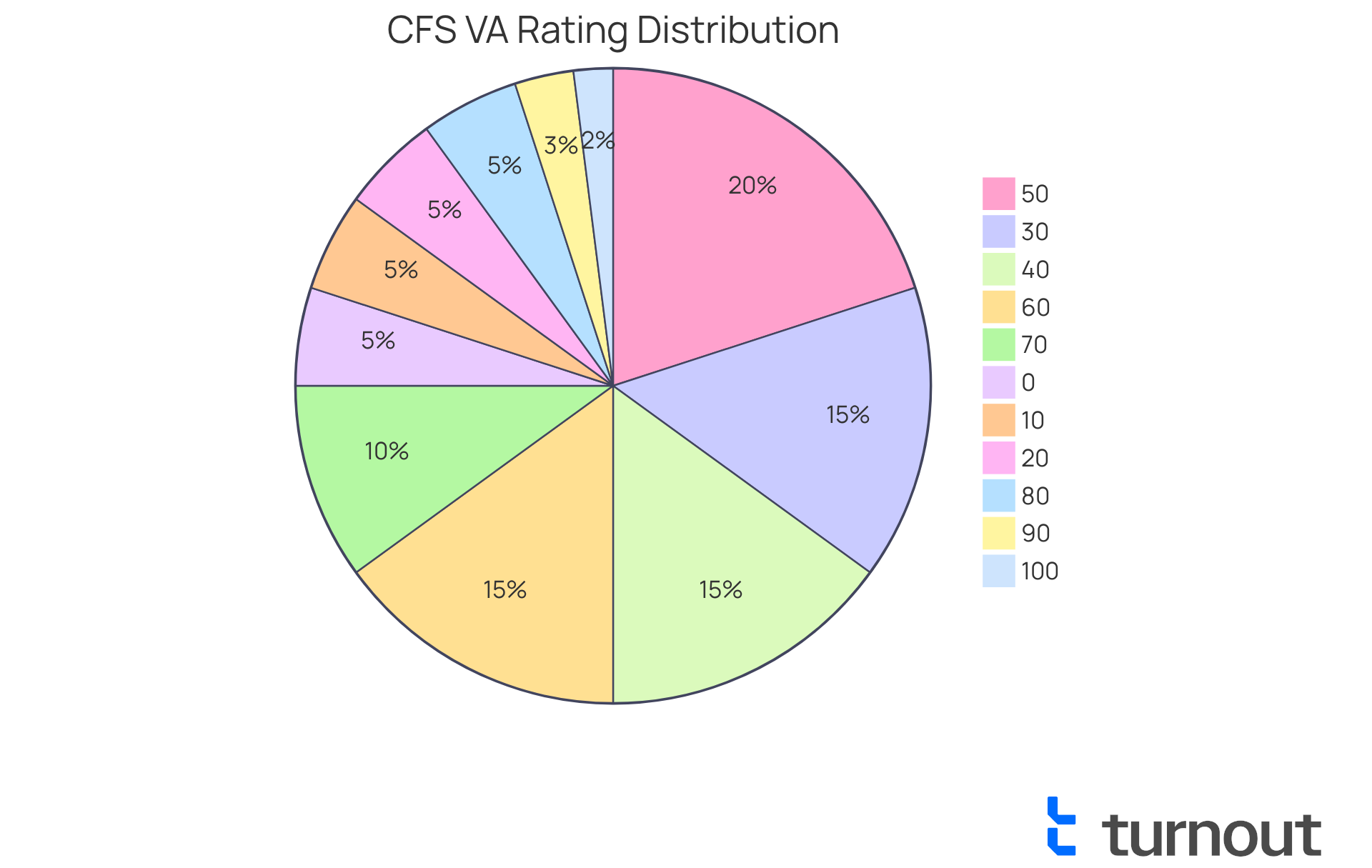
Actionable Steps for Securing a Favorable VA Rating for Chronic Fatigue Syndrome
To obtain a favorable chronic fatigue syndrome VA rating, we understand that former service members may feel overwhelmed. Here are some actionable steps to help you navigate this process with care and support.
-
Gather Comprehensive Medical Documentation: Ensure all medical records are current and clearly outline your diagnosis and treatment history. This documentation is crucial, as the VA requires a diagnosis of chronic fatigue syndrome VA rating supported by detailed medical evidence.
-
Document Symptoms Thoroughly: It's important to maintain a detailed log of your symptoms, including their frequency and severity. This will illustrate how CFS impacts your daily life and can significantly influence the chronic fatigue syndrome VA rating for your condition.
-
Seek Assistance from Advocacy Organizations: Utilize resources and support from groups like Turnout. They offer help through trained non-legal advocates and IRS-licensed enrolled agents to effectively navigate the submission procedure. Data indicate that former service members who participate in advocacy organizations experience greater success in their requests, achieving a success rate of approximately 50% for Higher-Level Reviews and Supplemental Requests.
-
Prepare for the C&P Exam: Be ready to discuss your symptoms in detail during the Compensation and Pension exam. Emphasize how they affect your daily functioning. Proper preparation can enhance the likelihood of a favorable outcome.
-
Stay Informed About the Appeals Process: If your claim is denied, it's common to feel discouraged. However, understanding the appeals process and gathering additional evidence can strengthen your case. The success rate for Higher-Level Reviews is approximately 50%, suggesting that many service members can attain positive outcomes upon appeal.
Please note that Turnout is not a law firm and does not provide legal advice. By following these steps, you can significantly enhance your chances of receiving the benefits you deserve. Remember, you are not alone in this journey; we’re here to help.
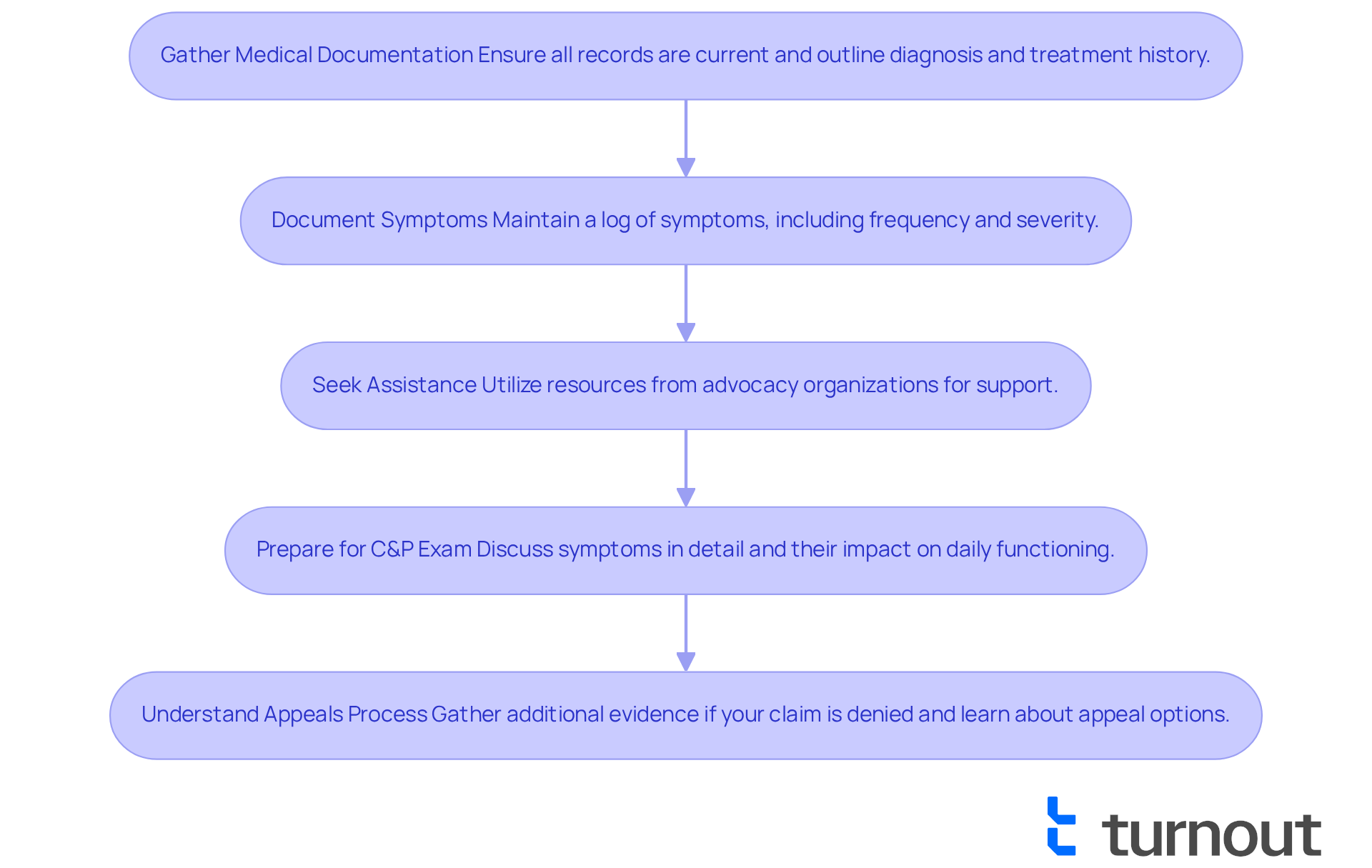
Conclusion
Navigating the complexities of securing a Chronic Fatigue Syndrome VA rating can feel overwhelming for veterans. We understand that this journey is not easy, but knowing the process and utilizing the right resources can significantly increase your chances of receiving the benefits you deserve. It’s crucial to focus on:
- Comprehensive documentation
- Awareness of evaluation criteria
- Support from advocacy organizations like Turnout, which can guide you through the application process
Key points to consider include:
- The necessity of thorough medical documentation
- How specific symptoms impact your daily life and work
- The various benefits available to veterans diagnosed with Chronic Fatigue Syndrome
If your initial claims have been denied, don’t lose hope; the appeals process is there to support you. We also highlight actionable steps to improve your chances of success. The integration of AI technology in the application process further emphasizes the evolving landscape of support available to veterans.
Ultimately, remember that the journey to securing a Chronic Fatigue Syndrome VA rating is a shared experience. You are not alone in this process. Engaging with support groups, understanding the nuances of the VA rating schedule, and actively participating in advocacy can empower you to navigate these challenges effectively. By taking proactive steps and utilizing available resources, you can advocate for yourself and work towards achieving the financial support and recognition you truly deserve.
Frequently Asked Questions
What is Turnout and how does it assist with chronic fatigue syndrome VA rating applications?
Turnout is a platform that streamlines the application process for individuals seeking chronic fatigue syndrome VA ratings by using advanced AI technology. It makes the application process more accessible and less intimidating for former service members, providing support through trained non-professional advocates.
Does Turnout provide legal representation for VA rating applications?
No, Turnout is not a legal practice and does not offer legal representation. It focuses on assisting with SSD requests through non-professional advocates.
What features does Turnout offer to support service members in their application process?
Turnout offers automated document management and proactive follow-ups to ensure service members remain informed and supported throughout their pursuit of benefits.
How does Turnout improve the chances of successful VA rating requests?
Turnout's streamlined method decreases processing durations and enhances the likelihood of successful requests, addressing the typical frustrations individuals face with conventional systems.
What are the VA evaluation criteria for chronic fatigue syndrome ratings?
The VA evaluates chronic fatigue syndrome VA ratings under diagnostic code 6354, considering the severity and frequency of symptoms. Ratings can vary from 10% to 100%, based on how much the condition affects daily life.
What key symptoms are considered in the evaluation for chronic fatigue syndrome VA ratings?
Key symptoms include persistent fatigue that does not improve with rest, cognitive difficulties (such as memory loss and concentration issues), sleep disturbances, and physical symptoms like muscle pain and joint discomfort.
Why is it important to record symptoms accurately when applying for a chronic fatigue syndrome VA rating?
Accurately recording symptoms is crucial for illustrating the seriousness of the condition and its impact on everyday life, which can significantly affect the evaluation outcome.
How does the current state of disability appeals affect veterans seeking chronic fatigue syndrome ratings?
With the Board of Veterans Appeals recently exceeding 92,000 dispatched disability appeals, the efficiency of AI in claims processing is becoming evident, promising quicker and more dependable results for service members.




